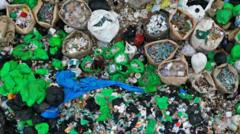In a striking demonstration of their commitment to addressing plastic pollution, 12 high-ranking United Nations officials recently wore silicone wristbands designed to monitor exposure to potentially harmful chemicals. During negotiations for a global treaty aimed at curbing plastic waste and its associated toxic substances, the wristbands provided crucial data on the chemical exposure levels of the participants, including U.N. High Commissioner for Human Rights, Volker Türk.
These silicone wristbands, reminiscent of colorful souvenirs, serve as a scientific tool that mimics the way human cells absorb chemicals. By analyzing the chemical composition accumulated by the wristbands, researchers can gain insight into the types and concentrations of harmful substances present in everyday environments and products, such as personal care items and air quality.
The initiative was executed by the International Pollutants Elimination Network (IPEN), a global coalition of organizations advocating for stricter regulations on harmful chemicals related to plastics. The results, published recently, revealed that each U.N. official was exposed to more than 30 different unregulated chemicals commonly associated with plastic manufacturing.
The IPEN project aims to raise awareness among negotiators of the tangible risks posed by these chemicals, potentially influencing their decisions as they work toward creating a comprehensive treaty against plastic pollution. By using their own experiences as a form of advocacy, the officials sought to highlight the significance of addressing both environmental and health implications related to plastic waste.
This unique study reinforces the notion that those involved in crafting policy are not immune to the very issues they aim to mitigate, thereby underscoring the urgency for effective global action in combating plastic pollution and protecting public health.
These silicone wristbands, reminiscent of colorful souvenirs, serve as a scientific tool that mimics the way human cells absorb chemicals. By analyzing the chemical composition accumulated by the wristbands, researchers can gain insight into the types and concentrations of harmful substances present in everyday environments and products, such as personal care items and air quality.
The initiative was executed by the International Pollutants Elimination Network (IPEN), a global coalition of organizations advocating for stricter regulations on harmful chemicals related to plastics. The results, published recently, revealed that each U.N. official was exposed to more than 30 different unregulated chemicals commonly associated with plastic manufacturing.
The IPEN project aims to raise awareness among negotiators of the tangible risks posed by these chemicals, potentially influencing their decisions as they work toward creating a comprehensive treaty against plastic pollution. By using their own experiences as a form of advocacy, the officials sought to highlight the significance of addressing both environmental and health implications related to plastic waste.
This unique study reinforces the notion that those involved in crafting policy are not immune to the very issues they aim to mitigate, thereby underscoring the urgency for effective global action in combating plastic pollution and protecting public health.

















